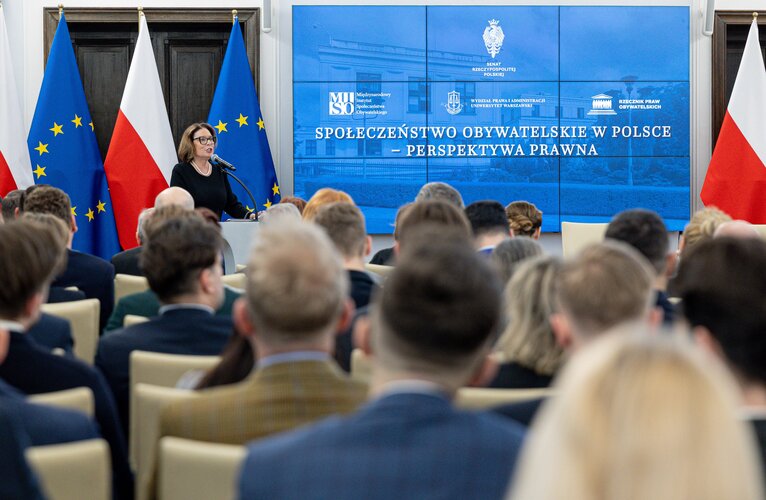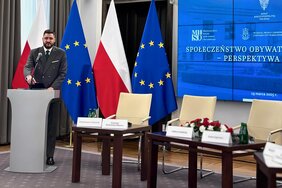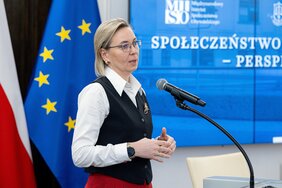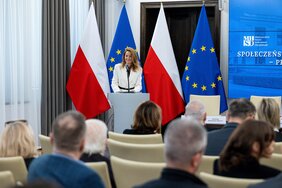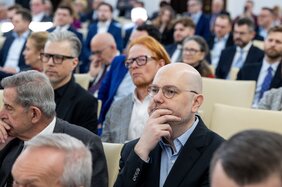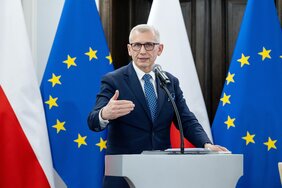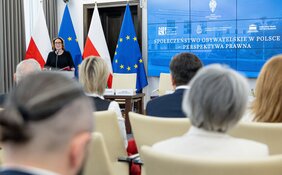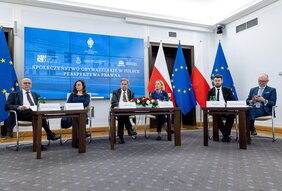MISO CONFERENCE IN THE SENATE OF THE REPUBLIC OF POLAND: “CIVIL SOCIETY IN POLAND - A LEGAL PERSPECTIVE”.
The conference brought together numerous representatives of public administration, academia, NGOs and social movements, think tanks, as well as politicians, diplomats, lawyers, opinion leaders and experts.
Discussions focused on the condition of civil society in Poland, the role of law in its functioning and development, and the challenges facing citizens and social organizations.
Opening of the conference
The conference was opened by Mateusz Komorowski, founder and president of MISO, who emphasized the importance of civil society in a democratic legal state. He noted that while the principles of this state guarantee broad opportunities for civic participation, real life situations often deviate from these assumptions, and many civil society institutions face numerous barriers - bureaucratic, procedural, financial and often political. President Komorowski raised several key open questions regarding the adaptation of the Polish legal system to the dynamically changing social reality and the effectiveness of mandatory regulations in the context of civic activity, which formed the starting point for further discussion.
Opening speeches
The first to speak was the Speaker of the Senate of the Republic of Poland Małgorzata Kidawa-Błońska, who emphasized that civil society is the foundation of democracy. As she added, it is our vaccine against the evil around us. It also builds resilience against attempts to limit freedom. According to the Senate Speaker, Poles have the gene of civil society. “We have the need and care to be a free and democratic society,” said Speaker Kidawa-Błońska. Our history proved this thesis, especially the time of partitions, occupation during World War II and the period of the People's Republic of Poland. In the most difficult moments, it was the citizens who took matters into their own hands.
This was followed by Adriana Porowska, Minister for Civil Society, who shared Ms. Speaker's view, pointing to the role of civil society during the pandemic, the war in Ukraine and the 2024 flood in Poland. According to her, building social resilience and ensuring security are currently the most important challenges facing the state and local government. “Without civil society, the state will not cope with these challenges,” Minister Porowska assessed.
Prof. Marcin Wiącek, the Ombudsman, noted that “A feature of government is a sense of infallibility, and the role of civil society is to disenchant this sense.” In his opinion, the principle of civil society, as enshrined in the Polish Constitution, is not sufficiently implemented in legal acts and the practice of public authorities. “The state should encourage the creation of civil society structures and strengthen in citizens the sense of empowerment and the feeling that the authority not only hears, but also listens,” he stressed. In his speech, the Ombudsman drew attention to the mistreatment of civil society, manifested, among other things, in attempts to obstruct the activities of activists, harassment and marginalization, or the use of legal and physical violence.
With regard to changes in the regulation of NGOs, he called for, among other things, a statutory definition of the criteria for applying for public funds, the strengthening of powers to participate in judicial and administrative proceedings, especially those concerning environmental protection, which requires full implementation of the Aarhus Convention. He pointed out the lack of sufficient guarantees to allow NGOs to present their demands during the legislative process. He drew attention to the excessive fiscalism and formalism reported by many organizations. He noted that this is felt most acutely by organizations whose members include people with disabilities, seniors and people in health crisis. According to the Ombudsman, there is also a need to organize legal instruments used by the Legislature. As he explained, this refers to entities that are formally an association or foundations, but it is difficult to consider them as part of civil society, because they serve other purposes, or they are organs of public authority.
The last opening speech was given by Professor Anna Zbiegień-Turzańska, Deputy Dean of the Faculty of Law and Administration at the University of Warsaw, who spoke about the principle of civil society in the context of societas civilis. According to her, for the development of civil society, it is important, first and foremost, to form social networks based on trust and cooperation. "The mission of the Faculty of Law and Administration is to actively participate in the formation of civil society and life attitudes, such as tolerance, trust, cooperation, as well as to foster concern for the common good and public affairs. Only on the basis of such values can civil society develop," Professor Zbiegień-Turzańska stressed.
Discussion panels
The opening speeches were followed by two discussion panels, during which prominent experts analyzed the condition of civil society in Poland, its problems and challenges, and the role and importance of law in its functioning and development.
The first panel entitled. “Legal conditions for the functioning of civil society in a democratic state of law,” moderated by attorney Sylvia Gregorczyk-Abram of the Free Courts Foundation, began with a speech by Deputy Speaker of the Senate Rafał Grupinski. He stressed that civil society plays a key role in building social harmony. In his opinion, a person achieves fullness when they are able to communicate with others and cooperate in organizing a common life. Civil society is one of the tools leading to happiness, and those in charge of political affairs should create the right conditions for its development. The panel included President of the National Council of Legal Advisors Włodzimierz Chróścik, Professor Hubert Izdebski of the Faculty of Law at SWPS University, Prof. Irena Lipowicz of the Faculty of Law and Administration at Cardinal Stefan Wyszyński University, President of the Helsinki Foundation for Human Rights Maciej Nowicki, and Deputy Minister of Justice Zuzanna Rudzińska-Bluszcz.
The second panel entitled. “Civil society institutions and Polish constitutional practice,” moderated by Prof. Wawrzyniec Konarski of the Vistula Academy of Finance and Business, was opened by Senator Krzysztof Kwiatkowski, Chairman of the Legislative Committee. He stressed that in recent years Poland has faced situations testing the resilience of democratic institutions, and that their effective operation was possible thanks to the responsible attitude of both the system and civil society. He called for a consistent strengthening of the resilience of civic institutions against attempts to dismantle them, and the development of mechanisms to protect democracy from those who try to “steal” it. The panel included Anna Materska-Sosnowska, PhD of the Stefan Batory Foundation, Deputy Director of the National Liberty Institute - Center for Civil Society Development, Adela Gąsiorowska, Vice President of the International Institute of Civil Society Maciej Pisz PhD, Professor Mirosław Wyrzykowski of the Faculty of Law and Administration of the UW, and Professor Andrzej Zoll of the Faculty of Law and Administration of the Jagiellonian University.
Summary
The conference “Civil society in Poland - a Legal Perspective” was an extremely important forum for the exchange of views and experiences on the constitutional foundations of civil society, as well as the functioning of its key institutions.
During the discussions it was possible not only to identify the key problems and challenges currently faced by civil society in Poland, but also to develop specific recommendations that can contribute to real changes.
Professor Irena Lipowicz of the Faculty of Law and Administration at Cardinal Stefan Wyszyński University drew attention to the role that civil society can play as a verifier of information in the context of Russia's ongoing cognitive war against Poland. She called for the preparation of appropriate legal solutions that would realistically support civil society organizations in countering disinformation. In her speech, she also appealed to the Senate to make a kind of “Copernican Revolution” in the way it treats civil society and its forms of action.
Among the most frequently raised demands were increasing the transparency of the legislative process, strengthening mechanisms for protecting civil rights, improving citizen participation in decision-making processes, and reforming the system of financing civil society organizations. Attention was also drawn to the need for stable and long-term institutional support for NGOs, which, although they often perform public functions, operate in conditions of limited resources and high public expectations.
The Chairman of the Legislative Committee, Senator Krzysztof Kwiatkowski, assured that the Senate is always open to the demands of NGOs. “With Senate projects, we try to organize the broadest consultations possible,” he stressed. He also recalled that thanks to a Senate amendment, approved by the Sejm, it is now possible to donate 1.5% of tax to public benefit organizations.
The common conviction of the conference participants was that only through systemic measures and the removal of existing barriers can a lasting foundation be laid for a strong, autonomous and responsible civil society, capable of co-creating a democratic state under the rule of law.


